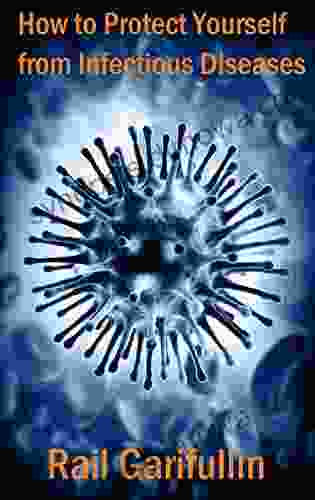Protect Yourself from Infectious Diseases: A Comprehensive Guide

In today's interconnected world, infectious diseases pose a significant threat to our health and well-being. With the rise of global travel and urbanization, the spread of infectious agents has become easier than ever before. Understanding the nature of infectious diseases and adopting effective preventive measures is crucial for safeguarding our health.
4.2 out of 5
| Language | : | English |
| File size | : | 696 KB |
| Screen Reader | : | Supported |
| Print length | : | 125 pages |
This comprehensive guide will provide you with essential information on how to protect yourself from infectious diseases. We will explore the most common types of infections, how they spread, and practical strategies to prevent them. By empowering yourself with knowledge and implementing these measures, you can significantly reduce your risk of contracting infectious diseases and stay healthy.
Types of Infectious Diseases
Infectious diseases are caused by microorganisms, such as bacteria, viruses, fungi, and parasites. These microorganisms can invade our bodies and cause various symptoms, ranging from mild to severe.
- Bacterial infections are caused by bacteria, such as Streptococcus and Staphylococcus. They can cause a wide range of infections, including skin infections, pneumonia, and meningitis.
- Viral infections are caused by viruses, such as influenza and SARS-CoV-2. Viral infections can affect the respiratory tract, digestive system, and other body systems.
- Fungal infections are caused by fungi, such as Candida and Aspergillus. They can affect the skin, nails, respiratory tract, and other body parts.
- Parasitic infections are caused by parasites, such as Plasmodium and Toxoplasma. They can affect the blood, digestive system, and other body parts.
How Infectious Diseases Spread
Infectious diseases can spread through various routes:
- Direct contact: Direct contact with an infected person or animal can transmit infectious diseases. This includes touching, kissing, or sharing bodily fluids.
- Indirect contact: Indirect contact with contaminated surfaces or objects can also spread infections. This includes touching doorknobs, countertops, or other items that have been contaminated with infectious agents.
- Airborne transmission: Some infectious diseases, such as influenza and measles, can be spread through the air when an infected person coughs or sneezes. These airborne droplets can travel distances and infect others who breathe them in.
- Waterborne transmission: Infectious diseases can also be transmitted through contaminated water. Drinking or coming into contact with water that contains harmful microorganisms can cause infections, such as cholera and cryptosporidiosis.
- Foodborne transmission: Consuming contaminated food can also lead to infections. This includes food that has been contaminated with bacteria, viruses, or parasites.
Effective Prevention Strategies
There are several effective strategies you can adopt to protect yourself from infectious diseases:
- Wash your hands frequently: Regular handwashing with soap and water is one of the most effective ways to prevent the spread of infections. Wash your hands before eating, after using the bathroom, after coughing or sneezing, and after coming into contact with potentially contaminated surfaces or objects.
- Practice social distancing: When possible, maintain a distance of at least 6 feet from others, especially when in crowded or public places. This helps reduce the risk of exposure to airborne droplets that may contain infectious agents.
- Cover your mouth and nose when coughing or sneezing: Use a tissue to cover your mouth and nose when coughing or sneezing. If you don't have a tissue, cough or sneeze into your elbow, not your hands.
- Clean and disinfect surfaces regularly: Regularly clean and disinfect frequently touched surfaces, such as doorknobs, countertops, and electronics. This helps reduce the risk of exposure to infectious agents that may linger on surfaces.
- Avoid touching your eyes, nose, and mouth: The eyes, nose, and mouth are common entry points for infectious agents. Avoid touching these areas, especially when your hands may be contaminated.
- Get vaccinated: Vaccination is one of the most effective ways to protect yourself from infectious diseases. There are vaccines available for many common infectious diseases, such as influenza, measles, and tetanus. Consult with your healthcare provider to determine which vaccines are recommended for you.
- Take care of your overall health: Maintaining a healthy immune system is essential for fighting off infections. Get enough sleep, eat a nutritious diet, exercise regularly, and manage stress. These factors all contribute to a strong immune system.
Special Considerations
Certain groups of people are at a higher risk of contracting infectious diseases. These include:
- Newborns and infants: Newborns and infants have immature immune systems and are more susceptible to infections.
- Older adults: As we age, our immune systems become less effective at fighting off infections.
- People with chronic health conditions: People with chronic health conditions, such as diabetes, heart disease, or cancer, have weakened immune systems and are more susceptible to infections.
- People who take immunosuppressant medications: People who take immunosuppressant medications, such as those who have recently undergone an organ transplant, have suppressed immune systems and are at high risk of infection.
If you are in one of these high-risk groups, it is especially important to take precautions to protect yourself from infectious diseases.
When to Seek Medical Attention
It is important to seek medical attention if you develop symptoms of an infectious disease. These symptoms may include:
- Fever
- Cough
- Sore throat
- Runny nose
- Muscle aches
- Fatigue
- Vomiting
- Diarrhea
If you are experiencing any of these symptoms, contact your healthcare provider for evaluation and treatment.
Protecting yourself from infectious diseases is essential for maintaining good health and well-being. By understanding the nature of infectious diseases, how they spread, and effective prevention strategies, you can significantly reduce your risk of contracting these harmful agents. Remember to practice good hygiene, get vaccinated, take care of your overall health, and seek medical attention when necessary. By following these guidelines, you can empower yourself and stay healthy in the face of infectious disease threats.
4.2 out of 5
| Language | : | English |
| File size | : | 696 KB |
| Screen Reader | : | Supported |
| Print length | : | 125 pages |
Do you want to contribute by writing guest posts on this blog?
Please contact us and send us a resume of previous articles that you have written.
 Book
Book Novel
Novel Page
Page Chapter
Chapter Text
Text Story
Story Genre
Genre Reader
Reader Library
Library Paperback
Paperback E-book
E-book Magazine
Magazine Newspaper
Newspaper Paragraph
Paragraph Sentence
Sentence Bookmark
Bookmark Shelf
Shelf Glossary
Glossary Bibliography
Bibliography Foreword
Foreword Preface
Preface Synopsis
Synopsis Annotation
Annotation Footnote
Footnote Manuscript
Manuscript Scroll
Scroll Codex
Codex Tome
Tome Bestseller
Bestseller Classics
Classics Library card
Library card Narrative
Narrative Biography
Biography Autobiography
Autobiography Memoir
Memoir Reference
Reference Encyclopedia
Encyclopedia Julian B Waddell
Julian B Waddell Margaret R Lee
Margaret R Lee Lori Hile
Lori Hile David Massey
David Massey Samuel Ade
Samuel Ade Janet Edwards
Janet Edwards David Elliott
David Elliott H R Phillips
H R Phillips David P Perlmutter
David P Perlmutter Debbie Lamedman
Debbie Lamedman Michael John Joseph Del Toro
Michael John Joseph Del Toro Stephen King
Stephen King David E Drew
David E Drew Dawn E Trussell
Dawn E Trussell Debra Groves Harman
Debra Groves Harman Dee Scott
Dee Scott Marion Tissot
Marion Tissot Mark Folger
Mark Folger Kulwant Marwal
Kulwant Marwal David S Alkek
David S Alkek
Light bulbAdvertise smarter! Our strategic ad space ensures maximum exposure. Reserve your spot today!

 Kyle PowellChants, Pranks, and Pageantry: A Magical Journey into the World of Hufflepuff...
Kyle PowellChants, Pranks, and Pageantry: A Magical Journey into the World of Hufflepuff... Roland HayesFollow ·9.6k
Roland HayesFollow ·9.6k John GrishamFollow ·9.3k
John GrishamFollow ·9.3k Chase SimmonsFollow ·19.4k
Chase SimmonsFollow ·19.4k Hunter MitchellFollow ·10k
Hunter MitchellFollow ·10k Ismael HayesFollow ·19.9k
Ismael HayesFollow ·19.9k Bo CoxFollow ·16.7k
Bo CoxFollow ·16.7k Roy BellFollow ·8.4k
Roy BellFollow ·8.4k Jaden CoxFollow ·19.2k
Jaden CoxFollow ·19.2k

 Aron Cox
Aron CoxMastering Project Management: The Ultimate Guide to...
In today's competitive...

 Dominic Simmons
Dominic SimmonsLet's Build Sue Fliess: Unleash the Polychrome Master...
Chapter 1: The...

 Mason Powell
Mason PowellMaster the Digital Marketing Landscape: Fundamentals of...
In the age of digital...

 Aubrey Blair
Aubrey BlairUncover the Secrets of Ancient Blades and Enchanting...
Embark on an Enchanting Journey into the...

 Shannon Simmons
Shannon SimmonsUnleash the Spooktacular with Spooky Crochet Tutorials...
Prepare to be spooked...

 Cade Simmons
Cade SimmonsImmerse Your Little Ones in a World of Enchantment with...
Nursery rhymes have forever ignited the...
4.2 out of 5
| Language | : | English |
| File size | : | 696 KB |
| Screen Reader | : | Supported |
| Print length | : | 125 pages |









